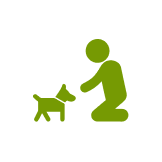Help us ensure a smooth delivery
Help us ensure a smooth delivery
SIZE GUIDE
Weaning Diet for Puppies & Kittens: The Ultimate Glow-Up from Milk to Munchies!
Puppy and kitten weaning diet is a process of getting your baby pet off your mother pet's milk or milk substitute and onto regular food. The period, which begins around the age of 3 to 4 weeks, is not all about food-changing—it's changing your puppy or kitten over for independent eating and healthy development.
At the stage of weaning, their gut is still finding its way around. Providing a balanced, nutrient-rich, and easily digestible weaning diet sets the tone for robust immunity, healthy growth, and improved long-term well-being.
At Supertails, we understand every Indian pawrent’s concern, making that first meal nourishing, gentle, and oh-so-yummy! Our carefully curated range covers everything from puppy weaning food to kitten weaning food, including soft food for puppies, graded by vet recommendations and real breeder feedback. Whether you need a high-protein pet weaning food for a growing litter or the best weaning food for kittens who are picky eaters, we've got you covered with variety, guidance, and smiles.
Make every mealtime a milestone, no stomach worries, no fuss, just happy, thriving little ones ready for a lifetime of health!
Why Choose a Weaning Food for Puppies and Kittens?
Explore Our Top Collection of Weaning Diet for Kittens and Puppies!
-
Puppy Boosters
As puppies begin to transition from mother's milk to solid food, puppy boosters provide additional support to promote optimal nutrition. These dietary supplements are intended to supply necessary proteins, lipids, and vitamins, covering nutritional gaps throughout the weaning process.
Why It's Important: Puppy boosters promote healthy growth and development by providing additional nutrients that may be required during this sensitive period. They can also assist supply extra calories for puppies that are underweight or require additional energy during weaning.
How To Use: Add puppy boosters to your puppy's food to improve their nutritional intake and overall health when they transition to solid food.
Top Picks:
-
Dry Puppy Food
Dry puppy food is a crucial component of the weaning process, especially as your puppy's teeth begin to emerge. Puppies often begin transitioning to dry kibble about 6 weeks of age, and it provides a comprehensive nutritional profile for their growing bodies.
Why It's Important: Dry kibble contains critical nutrients such as proteins, lipids, and minerals, which promote healthy growth. It also improves your puppy's oral health by cleaning their teeth while they chew.
How To Use: Begin by softening the dry kibble with water or a puppy milk replacer to make it simpler for your puppy to chew. Reduce the wetness gradually until your dog adjusts.
Top Picks:
-
Weaning Powder
Weaning powder is a carefully prepared supplement that gives additional nutrients while transitioning from milk to solid food. It makes solid foods more appealing and digestible for puppies during this stage.
Why It's Important: Weaning powder is intended to supplement the nutritional requirements of puppies who aren't yet ready for solid diets. It improves the nutritional value of ordinary puppy food and can provide additional support to dogs with dietary sensitivities.
How To Use: Mix the weaning powder into your puppy's food or milk replacement, following the package instructions for the proper proportions.
Top Picks:
-
Probiotic supplements
The weaning process can be difficult on a puppy's digestive tract as it adjusts to new foods. Probiotic pills promote a healthy balance of intestinal bacteria and aid digestion, keeping your puppy's stomach happy.
Why It's Important: Probiotics aid digestion and lessen pain associated with the transition to solid foods. They also strengthen the immune system and promote healthy gut flora.
How to Use: Add probiotics to your puppy's meals during the weaning period to help with digestive health.
Top Picks:
✅ Skyec Pup Start Weaning Supplement
✅ Skyec Kitty Start Weaning Supplement
✅ Vetoquinol Samolac Pro Weaning Supplement for Dogs and Cats
Post-Weaning Hygiene and Care for Puppies and Kittens
Once your pet is completely weaned, don't forget hygiene and aftercare. For full care, check out our dog hygiene essentials.
- Wash feeding bowls after each meal
- Have fresh water handy at all times
- Be on the lookout for changes in digestion or allergies
- Gradually switch to more solid, adult food in the next few weeks
Your pup or kitten is growing rapidly, and these tiny steps ensure they're growing the right way!
Bonus Read:
Check out our blog: The Complete Guide to Puppy Weaning: What You Need to Know - your full guide for stress-free, nutritious transitions!
Final Thoughts: Why Choosing the Right Weaning Diet for Puppies and Kittens Matters
The weaning diet is not food; it's the start of your pet entering adulthood. Selecting the appropriate products, implementing a gentle feeding regime, and showering them with love and care, you're giving them the best foundation for a happy, healthy life.
Whether you are a new paw-rent or a seasoned parent, Supertails has your back with top vet advice and high-quality pet food choices perfectly suited for all stages of life.
Shop now for the best puppy weaning supplies and begin your dog's journey to lifetime health!
FAQs
1. Can I give regular adult pet food and not weaning food?
Stop using adult standard cat food and puppy food during weaning. Kittens and puppies have sensitive digestive tracts that cannot process hard kibble or multi-element ingredients. Starter foods are soft, easy to digest, and formulated to promote early development. Adult food given too early can cause digestive distress or nutritional insufficiency.
2. Is weaning best with wet or dry food?
Semi-solid or wet food is best for weaning as it is softer and easy to chew and digest. Dry starter food also may be moistened with milk replacer or warm water to make it into mushy. You can gradually switch to soft dry kibble as your pet gets used to it. Gradual and gentle transition is the objective.
3. How often do I feed my pet during weaning?
During weaning, give 3 to 5 small meals daily depending on your pet's age and breed. Their small tummies are not capable of digesting large amounts at a time, so small but frequent meals will help them digest better and provide them with more energy.
4. What are the indications that my pet is ready to wean?
Your pet is ready to wean if it starts chewing on soft items, licking food, or is curious about what people are eating. More energy, weight gain, and independence from nursing are good indicators as well. Every pet grows at their own pace, so watch for these behavioral clues and ask your vet if in doubt.
5. Can kittens have the same weaning food as puppies?
No, kittens and puppies have different nutritional needs during weaning. Always choose a dedicated kitten weaning diet with the right protein, vitamins, and minerals for healthy growth. Explore our kitten starter foods or consult a vet for safe suggestions suited to your pet’s age.
6. How many times a day should I feed a weaning kitten?
Weaning kittens need small, frequent meals—ideally 4–5 times a day. Offer soft, wet, or moistened kitten weaning food and refresh their bowl often. Consistency helps with digestion and healthy growth. Need a sample schedule? Check with our nutrition experts for stepwise feeding tips.
7. How long should kittens be on a weaning diet?
Kittens are usually on a weaning diet for about 2–4 weeks, gradually moving to regular kitten food by 8–9 weeks of age. Stick to vet-recommended kitten weaning food during this stage for balanced nutrition. Still unsure? Chat with our vets online for the smoothest transition.
8. What’s the difference between puppy milk and weaning food?
Puppy milk mimics mother’s milk for nutrition when natural feeding is not possible, while weaning food is a soft, nutrient-rich starter diet that helps puppies adjust to solids. Wondering what’s right for your pup’s age? Browse our curated puppy starters and milk replacers for more options.
9. Is weaning food good for underweight puppies?
Yes, a high-quality puppy weaning diet is specially formulated with balanced calories and nutrients to help underweight pups catch up, provided other health issues are ruled out. For best results, monitor weight and always consult a vet if you’re worried—early help makes all the difference
10. Is the weaning diet suitable for all breeds?
Absolutely! Trusted puppy and kitten weaning foods are created to suit all breeds, but portion sizes may differ by size and growth rate. Check package guidelines or ask our experts for breed tips. Find breed-specific food in our Breed-Specific Puppy Food collection for further support.




































































































































































